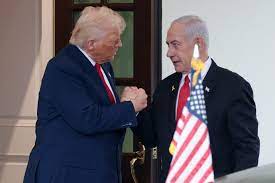Trump's Peace Plan: Cautious Optimism Amid a Complex Reality
September 27, 20252137 ViewsRead Time: 2 minutes

Font Size:
16
A recent opinion poll in Israel revealed a notable shift in public mood, showing widespread support for the peace plan that U.S. President Donald Trump is expected to present to end the war in Gaza. This may reflect a societal desire to seek an exit from the cycle of violence that has persisted for months.
The poll published by the Israeli newspaper "Maariv" revealed that 53% of Israelis support the proposed plan, while only 17% oppose it. Most importantly, support among coalition government voters reached 41% compared to 33% opposing, marking the first time that supporters of the peace initiative outnumbered opponents among government supporters.
Details of the plan circulated in the media include 21 points aimed at achieving an immediate ceasefire and the release of all hostages within 48 hours, in exchange for a gradual withdrawal of Israeli forces from Gaza. It also includes the release of one hundred to two hundred Palestinian prisoners and the disarmament of Hamas under the supervision of an international Arab force.
The humanitarian aspect received significant attention in the plan, which stipulates the opening of crossings without restrictions and facilitating the delivery of aid under the supervision of the United Nations. It also proposes a vision for reconstruction over five years and managing the sector through a Palestinian security force under international Arab supervision.
Notably, the plan includes American guarantees against Israel annexing the West Bank, which could serve as a reassuring element for the Palestinian side. It also proposes the formation of a Palestinian committee to manage the sector's affairs.
These developments come at a time when the humanitarian crisis in Gaza is escalating, with the death toll exceeding 60,000 according to UN estimates, while the sector suffers from widespread famine. Approximately 45 Israeli captives remain held in Gaza.
Trump's recent statements expressing optimism about the possibility of reaching a deal soon, alongside the poll results, may indicate a new climate forming around peace prospects. However, significant challenges remain, especially given the complexities on the ground and the conflicting interests among the various parties.
The proposed plan represents an attempt to break the current deadlock, but its success will depend on the ability of all parties to make concessions and find a balanced formula between Israeli security demands and Palestinian rights. The scene remains unclear, but the shift in Israeli public opinion may open a new window of hope.
The poll published by the Israeli newspaper "Maariv" revealed that 53% of Israelis support the proposed plan, while only 17% oppose it. Most importantly, support among coalition government voters reached 41% compared to 33% opposing, marking the first time that supporters of the peace initiative outnumbered opponents among government supporters.
Details of the plan circulated in the media include 21 points aimed at achieving an immediate ceasefire and the release of all hostages within 48 hours, in exchange for a gradual withdrawal of Israeli forces from Gaza. It also includes the release of one hundred to two hundred Palestinian prisoners and the disarmament of Hamas under the supervision of an international Arab force.
The humanitarian aspect received significant attention in the plan, which stipulates the opening of crossings without restrictions and facilitating the delivery of aid under the supervision of the United Nations. It also proposes a vision for reconstruction over five years and managing the sector through a Palestinian security force under international Arab supervision.
Notably, the plan includes American guarantees against Israel annexing the West Bank, which could serve as a reassuring element for the Palestinian side. It also proposes the formation of a Palestinian committee to manage the sector's affairs.
These developments come at a time when the humanitarian crisis in Gaza is escalating, with the death toll exceeding 60,000 according to UN estimates, while the sector suffers from widespread famine. Approximately 45 Israeli captives remain held in Gaza.
Trump's recent statements expressing optimism about the possibility of reaching a deal soon, alongside the poll results, may indicate a new climate forming around peace prospects. However, significant challenges remain, especially given the complexities on the ground and the conflicting interests among the various parties.
The proposed plan represents an attempt to break the current deadlock, but its success will depend on the ability of all parties to make concessions and find a balanced formula between Israeli security demands and Palestinian rights. The scene remains unclear, but the shift in Israeli public opinion may open a new window of hope.